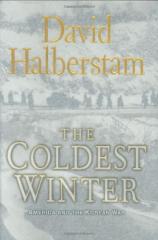The Coldest Winter: America and the Korean War
Review
The Coldest Winter: America and the Korean War
The literary world lost one of its "best and brightest" when David Halberstam was killed in a car accident in April 2007. His final gift --- to established fans and potentially new ones --- is THE COLDEST WINTER, perhaps the most dramatic and damning accounts of the Korean War ever put to paper.
Halberstam, author of such classics as the powers that be and THE FIFTIES --- in addition to his well-received sports books including THE TEAMMATES, SUMMER OF '49 and THE BREAKS OF THE GAME --- will be remembered for his tireless devotion to detail and unvarnished reporting. Here, he continues these high standards.
In his introduction, Halberstam notes that during his research at one Florida library he found "some eighty-eight books on Vietnam [including, one assumes, his own THE BEST AND THE BRIGHTEST], and only four on Korea….When servicemen returned from their tours, they found their neighbors generally not very interested in what they had seen or done."
"If American military history has shortchanged any of this country's wars in the past century," he writes in a later chapter, "it is Korea."
In 1950, few people even knew where this Far East nation was, much less what was at stake as the communist nations sought to extend their reach. And if they did know, they didn't much care; only five years removed from America's involvement in the latest war to end all wars, it was now becoming embroiled in another conflict.
The first part of THE COLDEST WINTER, which considers much of the back story to the War, is a bit plodding but nonetheless important and ultimately worthwhile as Halberstam sets the stage, describing the major and minor players such as Truman, Mao, Stalin and their supporting cast. He delves deeply into the lives of prominent American military leaders such as MacArthur, Walker and Almond. At times, the analyses --- such as how much family pressure MacArthur, the son of an admirable, if not outrageously successful, military man, had working for or against him (depending on one's point of view) --- seem way out of proportion to the overall history of the war.
If these mini-biographies appear overdone, patience will be rewarded by an understanding of these figures after Halberstam puts them "on the couch." No general attains such high rank without a large sense of ambition. But instead of seeking a common goal, it seems that these leaders were more interested in personal advancement and glory than leading their troops to victory for the sake of their nation. The reader will note with varying degrees of disappointment and/or disgust how petty many of these men were. Adjectives like "vainglorious," "over-confident," "ambitious" and "megalomania" flow freely. MacArthur often flew in the face of common sense: "Of the many professional sins of which [he] was guilty…including hubris and vanity, none was greater than his complete underestimating of his enemy."
Halberstam even asserts that "MacArthur did not in fact know that much about Asia," a statement that will no doubt surprise and shock those who have always been under the opposite impression, given his long tour of duty in Japan. But "Like Custer at the Little Big Horn [MacArthur] had neither eyes nor ears for information that might deter him from the swift attainment of his objective," the destruction of the enemy.
The callousness over consequences was by no means limited to the American military. Halberstam reports how, when confronted by the possibility of a nuclear strike, Mao responded, "China has millions of people….The death of ten or twenty million…is nothing to be afraid of."
Aside from the martial considerations were the politics at home. War is not just fought on battlefields; it is carried out at home by politicians as well. Truman, an underappreciated president at the time (MacArthur deemed him inferior, but then he felt that way about everyone. His underassessment of the abilities of the Korean and Chinese armed forces was a major shortcoming in American and allied tactics), had to deal with his own party leaders, worried about their own jobs and the survival of the Democratic ideals. Republicans, on the other hand, had a field day with his difficulties.
Of necessity, the more dramatic theme is the life-and-death struggle of the average soldier during the autumn and early winter of 1950, and Halberstam does an excellent job of recreating the abject fear and desperation with which these men had to carry out their jobs --- jobs made more difficult by the horrific cold and terrain for which they were ill-prepared, both in terms of equipment and proper leadership. His interviews with these veterans are heartbreaking and infuriating. This is not to say, however, that there are not heroes in THE COLDEST WINTER. Halberstam pays tribute to generals like Walton "Johnny" Walker and Matt Ridgway, as well as the junior officers who tried their best under impossible situations until major victories at Wonju and Cipyongni turned the tide, which in this case means bringing things to a stalemate. Korea was the first war that did not end in victory for the U.S., a prelude of military involvements to come.
In the end, these long-forgotten stories of the "G.I. Joe" make for a grand "final chapter" in Halberstam's distinguished opus.
Reviewed by Ron Kaplan on September 25, 2007
The Coldest Winter: America and the Korean War
- Publication Date: September 25, 2007
- Genres: History, Nonfiction
- Hardcover: 719 pages
- Publisher: Hyperion
- ISBN-10: 1401300529
- ISBN-13: 9781401300524





